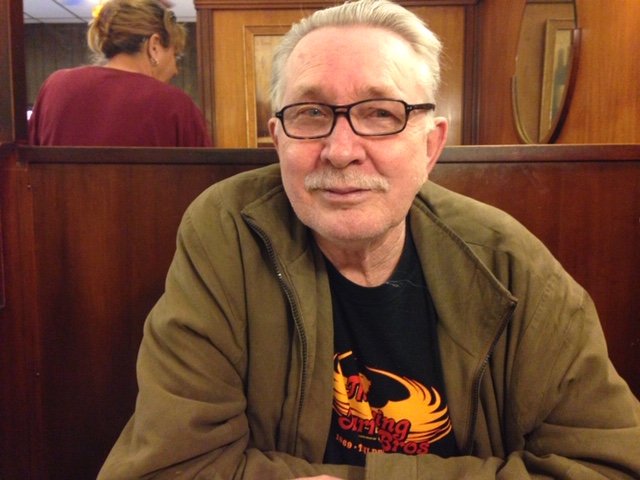Maurice Ferguson: Being a Nature Poet
/Maurice Ferguson lives in Buchanan, Virginia with his wife and a menagerie of stray animals. He retired after working 26 years for outpatient and inpatient substance abuse and alcohol treatment programs. Since retirement, he has volunteered at the V.A. Hospital, the Fincastle Jail, and the Transitional Living Center. He organized and conducted a poetry and prose contest for the Virginia Department of Corrections and collaborated with Janet Lembke in publishing a poetry anthology of prison writing titled The Walls Crumble: A Prison Anthology.
He has published poems in several journals, including Artemis, Roanoke Review, Piedmont Review, Inlet and Foreword Magazine. He, also, has been the literary editor for Artemis for many years now. He keeps composition books with him at all times and keeps copious notes, some of which becomes the fodder for future poems. He participates in an ongoing poetry group that meets 1-2 times a month at Hollins College. He has read his poetry at numerous colleges, including James Madison, VMI, Virginia Wesleyan, and Roanoke College.
Logan Tyler speaks with Maurice Ferguson below.
Your piece "Verbless" is a very challenging grammatical feat. How does a constraint of this sort (writing a verbless poem) encourage creativity?
Not only is the poem verbless, but it is also only one sentence. I only have two other poems like “Verbless”: “Conquistador” and “Assateague Lighthouse.” Like “Verbless,” these poems are three to six pages long and they were not written overnight. The key is to use connectives, as Faulkner did in The Light In August in the chapter titled “The Bear.” He uses connectives such as hence, whereby, where upon, thus, and so on.
Can you tell us about your experience working with substance-abuse patients in hospital and jail settings? Have those experiences influenced your writing? How so?
My years as a substance abuse counselor broadened my understanding of humanity. I realized that, oftentimes, the kindest people are the ones most abused. According to Dr. Carl Jung, “there is no coming to consciousness without pain.” I learned that there is often good in the worst of us and bad in the best of us. I have numerous poems that are the products of my years as a substance abuse counselor: “Richard Campbell,” “You Said You Would Not Kill Again,” “Winos on Glade Creek,” “The Roofer,” “Motel Hell,” and “Death at Traveltown” are based on real human beings. They are not imagined. I only changed their names to protect their identities.
A lot of your works include elements of nature. In what ways does nature inspire your writing?
Yes, I admit it. I am a nature poet. I say it best in my “Zen” poem, “The Universe sings to its audience.” This inverted view is not original to me; I take my cues from poets and philosophers: Heraclitus, René Descartes, Arthur Rimbaud, Gerard Manley Hopkins. To quote John Keats’ tombstone, “Here lies one whose name was writ in water.”
How did you go about making editorial decisions as poetry editor for Artemis? As an editor, what did you look for in a piece of writing?
As for my many years at Artemis, the bottom line for me is this: something must happen. The poem will challenge me to look at nature in a fresh way. When Sylvia Plath looked at the sunset she said, “huge splurge of vermilion” (Plath, “Two Campers In Cloud Country”). When Emily saw a snake she did not say, “I am afraid of snakes,” she called it, “A narrow Fellow in the Grass” and said she “never met this Fellow/ Attended or alone/ Without a tighter Breathing/ And Zero at the Bone” (Dickinson, “A narrow Fellow in the Grass”).
Lazy poets choose weak auxiliary verbs such as is, was, are… [etc] and they choose weak adjectives like good, bad, nice, and great. No action verbs such as shatter, pulverize, etc. Don’t tell me it’s a great day, show me it’s a great day. Every potential poet should be forced to read the dictionary.
I also love pantoums, sonnets, villanelles, and syllabic verses that remain five beats, ten syllables, never more, never less.
You graduated from Roanoke College in 1977. What was the English Department like at that time? What did you get from your time at Roanoke that was important to your writing?
My mother was my inspiration to write poetry. She loved William Shakespeare. She taught me Macbeth’s soliloquy and Hamlet’s soliloquy, Longfellow’s “Midnight Ride of Paul Revere,” Thayer’s “Mighty Casey at Bat,” and so on. Although my precious mother inspired me to write poetry, I was all moon, June, tune, and clippety clop rhythm till I met Lape and Wise. Mama made me want to write poetry but [my professors] taught me how to write it. I could never repay Roanoke College for the incredibly great education it provided me. I wish I knew how to forward this to the Alumni Association.
What advice do you have for young writers?
Tell them to read, read, read—not to imitate but to assimilate. They should write about everything from aardvarks to zebras and all that’s left in between. Their terrain should be from Angola to Zimbabwe. They should keep notebooks because memory cannot be trusted. Like Bill Stafford, they should know the difference between a nibble and a bite. Like Whitman, they must contain multitudes and shout their barbaric yawp across the rooftops.
Read Maurice Ferguson’s work here.

